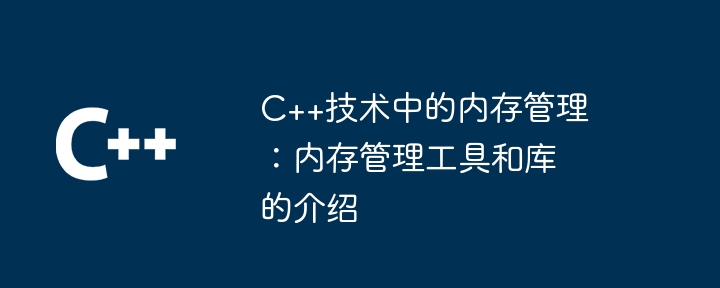Home >Backend Development >C++ >Memory management in C++ technology: an introduction to memory management tools and libraries
Memory management in C++ technology: an introduction to memory management tools and libraries
- 王林Original
- 2024-05-08 10:30:02890browse
C Memory Management: Memory management tools: debugger to identify memory errors; memory analysis tools provide memory usage insights. Memory management library: Smart pointers automatically manage memory allocation and release, such as C 11's unique_ptr and shared_ptr; the Boost library provides richer smart pointers; the memory_resource library is used for advanced memory management policy control.

Memory Management in C Technology: An Introduction to Memory Management Tools and Libraries
Introduction
In C programming, effective memory management is crucial because it directly affects the performance, reliability, and security of the application. This article will introduce commonly used memory management tools and libraries in C to help you understand and solve problems related to memory management.
Memory Management Tools
-
Memory Allocator: Allows an application to request and release memory from the operating system. Commonly used allocators include
new,delete, andmalloc. - Debugger: Used to identify memory-related errors such as memory leaks, invalid accesses, and buffer overflows. Visual Studio and GDB are popular C debuggers.
- Memory Analysis Tool: Provides detailed insights into application memory usage. Valgrind and Massif are widely used memory analysis tools.
Memory management library
- Smart pointers (C 11): Provides smart pointer classes (such as unique_ptr, shared_ptr and weak_ptr), these classes automatically manage the allocation and deallocation of memory, eliminating the need for manual memory management.
- Smart pointers for Boost library: A mature and powerful collection of smart pointers, providing richer functionality and customization options.
- memory_resource library (C 20): For advanced memory management, allowing applications to control the low-level strategies for memory allocation and deallocation.
Practical case
Consider the following code snippet:
int* ptr = new int[10]; // 分配 10 个整数的数组 // 使用数组 delete[] ptr; // 释放数组内存
In this example, ptr points to the allocated Array memory, which is properly released via delete[] after use. This type of manual memory management is error-prone, especially when complex memory structures are involved.
We can simplify this process by using smart pointers:
#include <memory> std::unique_ptr<int[]> ptr = std::make_unique<int[]>(10); // 使用数组 ptr.reset(); // 释放数组内存
std::unique_ptr will automatically manage the memory pointed to by ptr. When ptr goes out of scope or is released, it will automatically call delete[] to ensure that the memory is released correctly.
Conclusion
Memory management tools and libraries in C provide powerful ways to manage memory and improve application performance, reliability, and security. Familiarity with these tools and libraries is critical to writing well-maintained C code.
The above is the detailed content of Memory management in C++ technology: an introduction to memory management tools and libraries. For more information, please follow other related articles on the PHP Chinese website!

